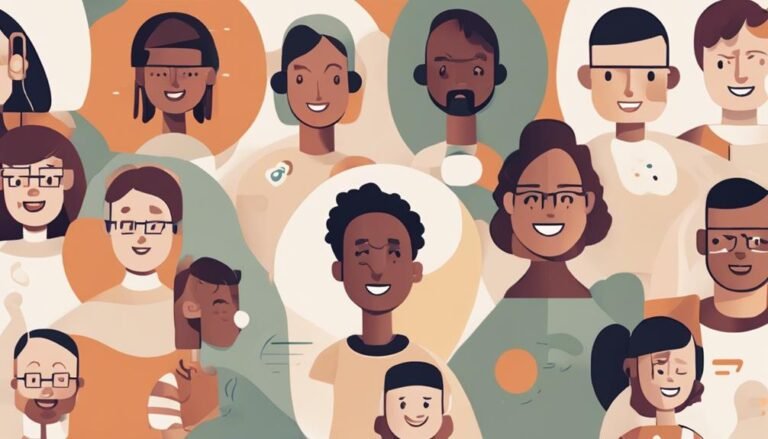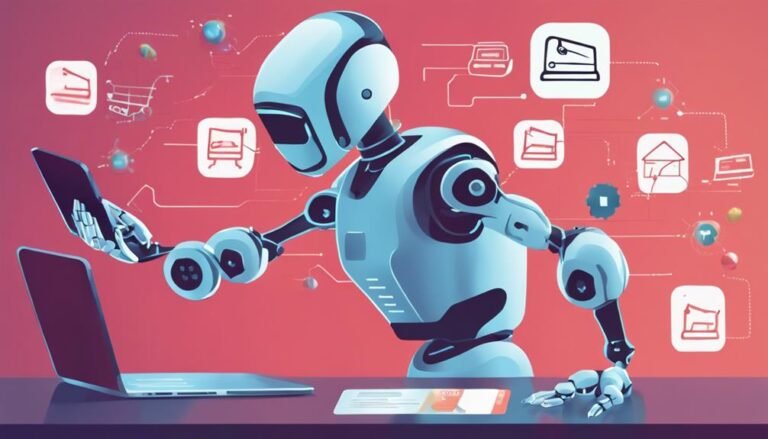AI for Social Good: Applications With Impact
In recent years, the integration of artificial intelligence (AI) in various sectors has shown promising potential for addressing societal challenges and fostering positive change. From revolutionizing healthcare practices to enhancing environmental sustainability efforts, AI applications have begun to make a tangible impact on social welfare.
However, the true extent of these advancements and the transformative power of AI for social good are still unfolding. The intersection of technology and altruism presents a compelling landscape worth exploring further, where innovation and compassion converge to shape a brighter future for us all.
Key Takeaways
- AI applications in healthcare improve diagnostics and patient care.
- AI aids in environmental conservation and wildlife protection.
- AI enhances education access and inclusivity for diverse learners.
- AI empowers communities, alleviates poverty, and supports disaster response.
AI in Healthcare Innovations
Advancing rapidly, artificial intelligence (AI) has shown remarkable potential in revolutionizing healthcare innovations. Through AI-powered technologies, healthcare diagnostics have experienced significant advancements, leading to more accurate and timely identification of diseases. AI algorithms can analyze complex medical data sets, such as imaging scans and genetic information, with a level of speed and precision that surpasses human capabilities. This capability not only enhances the efficiency of healthcare diagnostics but also improves the overall quality of patient care by enabling early detection and personalized treatment plans.
In patient care, AI plays a crucial role in streamlining processes and optimizing resource allocation within healthcare facilities. AI-powered systems can analyze vast amounts of patient data to identify patterns, predict outcomes, and recommend tailored interventions. This not only enhances the effectiveness of treatments but also improves patient outcomes and satisfaction. Additionally, AI-driven technologies in patient care can help healthcare providers in decision-making processes, ultimately leading to more efficient and personalized healthcare services.
Environmental Conservation Solutions
In the realm of environmental conservation, AI technologies are making significant strides, particularly in wildlife protection initiatives and deforestation monitoring technology. These solutions are proving to be invaluable in safeguarding endangered species and tracking the impact of human activities on forests.
Wildlife Protection Initiatives
Implementing innovative technology solutions has significantly enhanced wildlife protection initiatives in the realm of environmental conservation. Anti-poaching strategies and habitat monitoring have been greatly strengthened through the use of AI and machine learning algorithms. These technologies aid in detecting and preventing poaching activities, thus safeguarding endangered species.
Moreover, wildlife trafficking and population tracking have seen improvements due to advanced data analytics tools. By tracking the movement of wildlife populations and monitoring the illegal trade of animals, conservation efforts can be better targeted and more effective.
Deforestation Monitoring Technology
The application of technological solutions in environmental conservation has expanded beyond wildlife protection to encompass the monitoring of deforestation through innovative technology known as Deforestation Monitoring Technology. This technology utilizes satellite imagery and machine learning algorithms to track changes in forest cover over time.
By analyzing vast amounts of satellite data, these systems can detect deforestation patterns, illegal logging activities, and areas at risk of forest degradation. The integration of satellite imagery allows for real-time monitoring on a large scale, providing valuable insights for conservation efforts and policy-making.
Machine learning algorithms enhance the accuracy and efficiency of identifying deforestation trends, enabling stakeholders to take proactive measures to combat deforestation and preserve vital ecosystems.
Education Accessibility Enhancements
Enhancing educational accessibility through technological advancements has become a vital focus in the pursuit of equitable learning opportunities for all individuals. In the realm of education, AI is making significant strides to ensure inclusivity and support diverse learning needs.
Some key areas where AI is enhancing education accessibility include:
- Learning assistance tools: AI-powered tools like language translation services, text-to-speech converters, and personalized learning platforms are revolutionizing how students with different learning styles engage with educational content.
- Inclusive curriculum development: AI algorithms analyze vast amounts of data to help educators tailor curriculum materials to meet the needs of diverse learners, ensuring that educational content is accessible to all.
Poverty Alleviation Strategies
In addressing societal disparities beyond educational accessibility, strategies leveraging AI for poverty alleviation have emerged as a significant focus in promoting equitable opportunities and social well-being. AI technologies are being harnessed to identify patterns, optimize resource allocation, and empower communities to uplift themselves economically. By analyzing vast amounts of data, AI can help in identifying key areas for intervention, designing targeted programs for economic development, and monitoring their effectiveness.
Community empowerment plays a crucial role in sustainable poverty alleviation efforts. AI tools can facilitate community engagement, enhance decision-making processes, and promote inclusivity in policy formation. By involving local communities in the design and implementation of poverty alleviation strategies, AI can ensure that interventions are culturally sensitive and address the specific needs of the population.
Moreover, economic development initiatives supported by AI can stimulate job creation, enhance skills training programs, and foster entrepreneurship opportunities. By leveraging AI for poverty alleviation, stakeholders can work collaboratively towards building resilient communities and reducing socio-economic disparities.
Disaster Response and Recovery
Utilizing advanced AI technologies in disaster response and recovery operations offers unprecedented capabilities for efficient resource allocation and rapid decision-making. Artificial Intelligence (AI) plays a crucial role in enhancing emergency communication and real-time mapping during disasters.
Here are some ways AI contributes to disaster response and recovery:
- Predictive Analytics: AI algorithms analyze data to predict disaster occurrence, helping authorities prepare in advance.
- Resource Optimization: Through AI-powered tools, resources like food, water, and medical supplies can be allocated based on real-time needs assessment.
- Damage Assessment: AI enables quick assessment of the extent of damage by analyzing satellite imagery and drone footage.
- Rescue Operations: AI algorithms can optimize search and rescue efforts by processing large amounts of data to locate survivors efficiently.
Justice and Equity Advancements
AI technologies have the potential to revolutionize justice and equity advancements through their ability to analyze vast amounts of data and identify patterns that can aid in addressing systemic biases and promoting fairness. By leveraging machine learning algorithms, predictive analytics, and natural language processing, AI is being utilized in various aspects of the legal system and social services to drive equity reform and enhance justice technology. Below is a table illustrating key areas where AI is making a significant impact in advancing justice and equity:
| Justice and Equity Advancements | Description |
|---|---|
| Risk Assessment Tools | AI algorithms help in predicting recidivism rates and informing decisions on bail and sentencing. |
| Bias Detection Systems | AI systems can identify biases in decision-making processes and suggest corrective actions. |
| Legal Research Automation | AI streamlines legal research processes, making information more accessible and aiding in case preparation. |
| Sentiment Analysis in Courts | AI analyzes emotions and sentiments in court proceedings to improve understanding and decision-making. |
| Equity in Resource Allocation | AI optimizes resource allocation in social services to ensure fair distribution based on needs and impact. |
Mental Health Support Systems
Enhancing mental health support systems through innovative technologies has become a focal point in addressing the growing challenges faced by individuals seeking mental health assistance. In the realm of mental health, AI-driven solutions are making significant strides towards providing accessible and effective support.
- Virtual Therapy: Virtual therapy platforms offer individuals the opportunity to receive counseling and therapy remotely, breaking down barriers to access mental health services.
- AI Chatbots: AI chatbots are being used to provide immediate and personalized responses to individuals in need of emotional support, guiding them towards appropriate resources.
- Emotional Well Being: AI interventions are being developed to monitor individuals' emotional well-being through analyzing their online behavior and interactions, offering timely interventions when signs of distress are detected.
- AI Interventions: AI-powered interventions are being utilized to provide personalized mental health recommendations and resources based on individuals' specific needs and preferences.
Conclusion
In conclusion, the applications of AI for social good have demonstrated significant impact across various sectors, from healthcare to environmental conservation to education accessibility.
As the adage goes, 'necessity is the mother of invention,' and AI has proven to be a valuable tool in addressing complex social challenges.
By leveraging AI technologies in innovative ways, we can continue to advance social good and create positive change for communities around the world.







